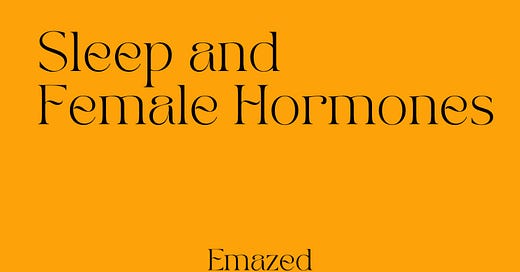Women's health was, for a long time, not given the spotlight it deserved in research. (What a surprise, right?) For years, our unique biology was simply compared to men's, rather than being studied for its unique characteristics. According to a new report from the World Economic Forum, women spend 25% more of their lifetime in poor health than men.1
But guess what? Recently, women's health has gained much-deserved attention, not just in research, but in business too. With a recent McKinsey’s report suggesting that closing the women's health gap by 2040 could add at least $1 trillion to the economy, just think about all the things we might learn about ourselves! 2
One key area in women's health that's gaining recognition is the interplay between sleep and our female hormones. In today’s issue let's delve into this topic.
We'll examine:
💡 Why do we need sleep?
💤 Explore the different sleep phases and their characteristics.
😴 Discuss what happens when these phases get disrupted.
Plus, we'll discuss:
❣️ Our menstrual cycle, and how the fluctuations of estrogen and progesterone can affect our sleep.
✅ Tips to share with you, that could help improve your sleep quality and overall life experience.
Ready to jump in? Let's get started…
Understanding Sleep and Its Phases
According to our good friend Wiki, "Sleep is a state of reduced mental and physical activity where your consciousness takes a little vacation and certain sensory activity says 'not today'".
More or less… The same idea.
Why do we sleep? I will disappoint you as we're still trying to find out the exact purpose of sleep. Sleep is something we all do, we know it's carefully controlled. It is a crucial part of our lives that affects everything from our mood to our physical health.
During sleep, our body progresses through several distinct phases. Each phase has specific benefits and potential consequences if disturbed.
😴 In the initial stage of sleep, known as light sleep - NREM 1 (non-rapid eye movement).
Brain waves begin to slow down, and muscles start to relax.
Lasts for just a few minutes, and you might notice some short periods of muscle twitches or hypnic jerks (Yes, ladies, that’s the moment).
Disruptions can lead to difficulties falling asleep and often waking up during the night, which can leave us with feelings of restlessness upon waking.
😴 As we progress into intermediate sleep (NREM 2).
Brain waves continue to slow down, with occasional bursts of rapid brain activity known as sleep spindles
This stage helps control our body temperature and heart rate.
If this sleep stage is disturbed, it can mess up our memory and thinking skills, making it harder to learn and remember things.
😴 Then we fall straight into deep sleep (NREM 3), also known as slow-wave sleep.
Deep sleep is essential for physical restoration, immune function, and tissue repair.
Domination of delta waves, signaling a significant decrease in brain activity.
Interruptions during deep sleep can weaken the immune system and contribute to feelings of fatigue.
😴 Lastly, REM sleep is marked by rapid eye movements and vivid dreams.
Brain activity increases to levels similar to wakefulness, but the body's muscles are paralyzed, except for the muscles involved in breathing and eye movements (pretty cool, huh?).
REM sleep supports cognitive processes, emotional regulation, and memory consolidation.
Disruptions during REM sleep can cause things like mood swings, difficulties with thinking and memory, and emotional ups and downs.
Yeah, exactly…
Alright, now that you learned about the phases and the potential consequences of disruption, you might be wondering:
😤 "So, what could cause all these disruptions???"
Honestly, a bunch of factors can play tricks. It's a delicate balance. Things like noise, light, or an uncomfortable bed can make it hard for us to get to those sleep stages.
Moreover, if we keep changing our sleep schedules, drink too much caffeine or alcohol, or expose ourselves to blue light before bedtime, we're messing with our natural sleep-wake cycle. And let's not forget about internal stuff like stress, anxiety, and some medical conditions that can also disturb our sleep.
So, what's the takeaway here? It's simple, really. We need to make quality sleep hygiene a priority. This way, we can get through each sleep stage without any hiccups and wake up feeling physically refreshed, mentally sharp, and emotionally balanced.
Now, what about those hormones??
❣️ The Connection Between Sleep and Female Hormones
Hormonal fluctuations, particularly during the menstrual cycle in women, can impact… everything💀. But also, sleep patterns. It refers mostly to changes in favorite estrogen and less favorite progesterone during the follicular and luteal phase of the menstrual cycle.
🫰🏻 So… Hello beloving estrogen. Known for playing a key part in the female reproductive system, you also have a say in our sleep patterns, don't you? By influencing neurotransmitter systems like serotonin and dopamine, it sure helps regulate sleep. During the follicular phase of your menstrual cycle (the phase leading up to ovulation, or what we could call the best time of the month), estrogen levels start to rise. This can lead to an increase in alertness. While this rise in estrogen can give you a nice boost in mood and energy levels, it might also make it a bit tougher to fall asleep or stay asleep, thanks to that extra excitement.
💀 On the other hand, progesterone, which is the main star during the luteal phase (you know, the one after ovulation that we all just love... not), promotes relaxation and has soothing effects. Progesterone acts on gamma-aminobutyric acid (let's just call it GABA, much easier) receptors in the brain, inhibiting neuronal activity and promoting sleep. However, while progesterone facilitates deep sleep, it can also lead to increased fragmentation of sleep, with more frequent awakenings throughout the night and disruptions in REM sleep, which can lead to mood swings and feeling irritated by trivial matters, including your boyfriend's breathing. Sorry bebe, its progesterone. 3
Furthermore, fluctuations in estrogen and progesterone levels can influence other sleep-related factors, such as body temperature regulation and respiratory function. Estrogen, for instance, can affect thermoregulation, leading to fluctuations in body temperature that may disrupt sleep continuity (not cool, estrogen, not cool). 4
So basically, estrogen and progesterone have this kind of back-and-forth thing going on during different parts of the menstrual cycle. This little dance they do affects sleep a lot, like how good it is, how long it lasts, and how often you wake up.
Knowing how sleep works and how sleep patterns can change during the menstrual cycle is a great step toward adapting techniques to boost sleep quality.
✅ Sleep Tip (or six)
Some techniques included during certain cycle phases can help us ease the side effects of hormonal fluctuations on sleep.
In the follicular phase, when estrogen is on the rise, it can be beneficial to make time for relaxation activities like meditation, yoga, or gentle stretching before heading to bed. These can help ease your excitement and let you sleep more comfortably.
During the luteal phase, when progesterone takes the lead, it's a great idea to focus on setting the scene for a peaceful night's rest. Dimming the lights and cutting down screen time can contribute to a deeper, more restorative sleep.
But remember, there are some strategies for a good night's sleep that we all can benefit from. By blending these into your daily routine, not only you reduce the impact of hormonal fluctuations on your sleep but also create a powerful sleep hygiene that benefits your whole body.
Here's what you should do:
Establish a Regular Sleep Schedule and Routine: Try to go to bed and wake up at the same time every day. This can help regulate your body's internal clock and improve your sleep quality.
Create a Restful Environment: Make your sleep environment quiet, dark, and cool. Consider using earplugs and an eye mask. Make sure your mattress is not too old/used.
Avoid Blue Light: Avoid blue light from screens 2 hours before bed. Skip texting, social media, games, and apps. Blue light suppresses melatonin production which is necessary to induce sleep. If you need to consider downloading blue-light-reducing software. 🫡
Be Mindful of What You Eat and Drink: Avoid caffeine after lunch, large meals, and alcohol close to bedtime, ideally 3 hours before bedtime. Also, avoiding drinking liquids an hour before bedtime can help you sleep through the whole night.
Get Regular Exercise: Obvi, regular physical activity can help you fall asleep faster and enjoy deeper sleep. BUT, avoid heavy workouts close to your bedtime as this increases cortisol which impairs sleep. 56
Track Your Sleep: Additionally, consider using sleep tracking devices like an Apple Watch, smart ring (e.g., Oura Ring, Evie Ring - tailored for women), or other sleep trackers to monitor sleep metrics such as duration, stages, and quality.
You might think I'd suggest we take baby steps, adding one thing at a time. But trust me, these little tips work best when done all together. So, gear up with all you need, and give all these tips a try at once.
I'm pretty sure you'll sleep like a baby and your next day is going to be amazing!
Thank you for reading and good luck,
I talk to you soon.
xx
E
Hey there! Your thoughts and feedback mean the world to me as I'm always looking to improve. If you could spare a moment to drop a comment below or write me at emazedbye@gmail.com, I'd be super grateful. It could be about this topic, suggestions for future chats, or just your general musings. Truly, your input is priceless!
How to close the women’s health gap, according to Davos experts | World Economic Forum. (n.d.). Retrieved February 6, 2024, from https://www.weforum.org/agenda/2024/01/women-health-davos-2024/
Closing the women’s health gap: A $1 trillion opportunity to improve lives and economies | McKinsey. (n.d.). Retrieved February 6, 2024, from https://www.mckinsey.com/mhi/our-insights/closing-the-womens-health-gap-a-1-trillion-dollar-opportunity-to-improve-lives-and-economies
Pengo, M. F., Won, C. H., & Bourjeily, G. (2018). Sleep in Women Across the Life Span. Chest, 154(1), 196. https://doi.org/10.1016/J.CHEST.2018.04.005
Mehta, N., Shafi, F., & Bhat, A. (2015). Unique Aspects of Sleep in Women. Missouri Medicine, 112(6), 430. /pmc/articles/PMC6168103/
Vitale, K. C., Owens, R., Hopkins, S. R., & Malhotra, A. (2019). Sleep Hygiene for Optimizing Recovery in Athletes: Review and Recommendations. International Journal of Sports Medicine, 40(8), 535. https://doi.org/10.1055/A-0905-3103
Baranwal, N., Yu, P. K., & Siegel, N. S. (2023). Sleep physiology, pathophysiology, and sleep hygiene. Progress in Cardiovascular Diseases, 77, 59–69. https://doi.org/10.1016/J.PCAD.2023.02.005






